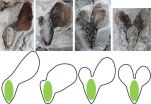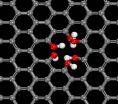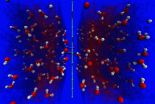INFORMATION:
York University is helping to shape the global thinkers and thinking that will define tomorrow. York U's unwavering commitment to excellence reflects a rich diversity of perspectives and a strong sense of social responsibility that sets us apart. A York U degree empowers graduates to thrive in the world and achieve their life goals through a rigorous academic foundation balanced by real-world experiential education. As a globally recognized research centre. York U is fully engaged in the critical discussions that lead to innovative solutions to the most pressing local and global social challenges. York U's 11 faculties and 25 research centres are thinking bigger, broader and more globally, partnering with 280 leading universities worldwide. York U's community is strong ? 55,000 students, 7,000 faculty and staff, and more than 275,000 alumni.
Media Contact: Gloria Suhasini, York University Media Relations, 416 736 2100 ext. 22094, suhasini@yorku.ca
New lake surface temperature database will help to study climate change: York U researcher
A group of York University investigators and their international counterparts have jointly created a database of lake surface temperatures, to help study ecological effects of climate change
2015-03-17
(Press-News.org) TORONTO, March 17, 2015 - A group of York University investigators and their international counterparts have jointly created a database of lake surface temperatures, to help study ecological effects of climate change.
"There has been a significant need to put together a database like this, considering the rapid warming of lakes," observes Professor Sapna Sharma in the Department of Biology in the Faculty of Science who led the international effort.
As part of the Global Lake Temperature Collaboration (GLTC) project, Sharma and several of her undergraduate students, Anam Qudrat and Samantha Stefanoff, gathered a database of summer-mean lake surface temperature for 291 lakes and reservoirs around the world, including data collected from 1985 to 2009.
"Previously there were only satellite collected data available globally and we have doubled the data through in situ programs such as the Global Lake Ecological Observatory Network and long-term monitoring programs, which collect data from visiting these locations," Sharma adds.
Eighty two researchers from more than 20 countries were involved in the effort that began in 2011. They collected data from major lakes in North America, South America, Europe, Asia and the Oceanic region.
The database provides information such as air temperature, solar radiation and cloud cover that define climate, and geomorphometric characteristics including latitude, longitude, elevation, depth and volume, which may influence lake temperature.
"Our plan is to include additional lakes, longer time periods, and vertical temperature profile data," says Sharma, adding, "This unique, global dataset will offer an invaluable perspective on lake thermal conditions in this ever-changing global climate."
The GLTC group's article summarizing the project was published today, March 17, in Nature's Scientific Data journal.
ELSE PRESS RELEASES FROM THIS DATE:
HIV not as infectious soon after transmission as thought
2015-03-17
AUSTIN, Texas - People who recently have been infected with HIV may not be as highly infectious as previously believed, a finding that could improve global efforts to prevent HIV transmission and save lives. In particular, the finding bolsters the strategy of treating patients with antiretroviral drugs before the onset of AIDS to prevent transmission.
Mathematical epidemiologists Steve Bellan, a postdoctoral researcher at The University of Texas at Austin, and Lauren Ancel Meyers, a biology professor at the university, authored the paper with researchers from McMaster ...
Time-lapse snapshots of a nova's fading light
2015-03-17
Scientists in a collaboration led by Dai Takei of the RIKEN SPring-8 Center in Japan have, for the first time, examined a detailed 'time lapse' X-ray image of the expansion of a classical nova explosion using the GK Persei nova -- a binary star system which underwent a nova explosion in 1901.
Through this work, they hope to gain a better understanding of the expansion of gases in the universe, including not only in classical novae but also in supernovae--tremendous stellar explosions that are believed to be responsible for the creation of heavy elements such as uranium ...
Vitamin D may help prevent and treat diseases associated with aging, Loyola study finds
2015-03-17
Vitamin D may play a vital role in the prevention and treatment of diseases associated with aging, according to researchers at Loyola University Chicago Marcella Niehoff School of Nursing (MNSON). These findings were published in the latest issue of the Journal of Aging and Gerontology.
Researchers reviewed evidence that suggests an association between vitamin D deficiency and chronic diseases associated with aging such as cognitive decline, depression, osteoporosis, cardiovascular disease, high blood pressure, Type 2 diabetes and cancer.
"Vitamin D deficiency is a ...
Women retain insulin sensitivity better than men
2015-03-17
Hamilton, ON (March 17, 2015) - It's long been known that obese men are more likely to develop type two diabetes than obese women, but researchers at McMaster University have discovered it may be related to a difference between the sexes in the activity of a protein in the muscle.
As people become overweight, their skeletal muscle develops insulin resistance that can lead to type two diabetes. In a paper published by Scientific Reports today, the research team found the activity of this protein, called PTEN (for Phosphatase and tensin homolog deleted on chromosome 10), ...
'Distracted driving' at an all-time high; new approaches needed
2015-03-17
CORVALLIS, Ore. - Young, inexperienced drivers have always gotten into more automobile accidents, but if you add in a lot of distractions, it's a recipe for disaster - and a new Pacific Northwest research program is learning more about these risks while identifying approaches that may help reduce them.
Distractions have been an issue since the age of the Model T, whether a driver was eating a sandwich or talking to a passenger. But the advent of cell phones, text messaging and heavy urban traffic has taken those distractions to a historic level, say researchers, who ...
Conifers' helicoptering seeds are result of long evolutionary experiment
2015-03-17
The whirling, winged seeds of today's conifers are an engineering wonder and, as University of California, Berkeley, scientists show, a result of about 270 million years of evolution by trees experimenting with the best way to disperse their seeds.
The first conifer species that produced seeds that whirl when they fall used a variety of single- and double-winged designs. Whirling, or helicoptering, keeps a seed aloft longer, increasing the chance that a gust of wind will carry a seed to a clearing where it can sprout and grow unimpeded by competitors
"Winged seeds may ...
Imperfect graphene opens door to better fuel cells
2015-03-17
The honeycomb structure of pristine graphene is beautiful, but Northwestern University scientists, together with collaborators from five other institutions, have discovered that if the graphene naturally has a few tiny holes in it, you have a proton-selective membrane that could lead to improved fuel cells.
A major challenge in fuel cell technology is efficiently separating protons from hydrogen. In a study of single-layer graphene and water, the Northwestern researchers found that slightly imperfect graphene shuttles protons -- and only protons -- from one side of the ...
Graphene membrane could lead to better fuel cells, water filters
2015-03-17
An atomically thin membrane with microscopically small holes may prove to be the basis for future hydrogen fuel cells, water filtering and desalination membranes, according to a group of 15 theorists and experimentalists, including three theoretical researchers from Penn State.
The team, led by Franz Geiger of Northwestern University, tested the possibility of using graphene, the robust single atomic layer carbon, as a separation membrane in water and found that naturally occurring defects, essentially a few missing carbon atoms, allowed hydrogen protons to cross the ...
Genetic background determines whether aspirin/NSAIDS will reduce colorectal cancer risk
2015-03-17
An analysis of genetic and lifestyle data from 10 large epidemiologic studies confirmed that regular use of aspirin or other non-steroidal anti-inflammatory drugs (NSAIDs) appears to reduce the risk of colorectal cancer in most individuals. The study being published in the March 17 issue of JAMA found that a few individuals with rare genetic variants do not share this benefit. The study authors note, however, that additional questions need to be answered before preventive treatment with these medications can be recommended for anyone.
"Previous studies, including randomized ...
Effect of aspirin, NSAIDs on colorectal cancer risk may differ from genetic variations
2015-03-17
Among approximately 19,000 individuals, the use of aspirin and nonsteroidal anti-inflammatory drugs (NSAIDs) was associated with an overall lower risk of colorectal cancer, although this association differed according to certain genetic variations, according to a study in the March 17 issue of JAMA.
Considerable evidence demonstrates that use of aspirin and other NSAIDs is associated with a lower risk of colorectal cancer. However, the mechanisms behind this association are not well understood. Routine use of aspirin, NSAIDs, or both for prevention of cancer is not currently ...
LAST 30 PRESS RELEASES:
Test platforms for charging wireless cars now fit on a bench
$3 million NIH grant funds national study of Medicare Advantage’s benefit expansion into social supports
Amplified Sciences achieves CAP accreditation for cutting-edge diagnostic lab
Fred Hutch announces 12 recipients of the annual Harold M. Weintraub Graduate Student Award
Native forest litter helps rebuild soil life in post-mining landscapes
Mountain soils in arid regions may emit more greenhouse gas as climate shifts, new study finds
Pairing biochar with other soil amendments could unlock stronger gains in soil health
Why do we get a skip in our step when we’re happy? Thank dopamine
UC Irvine scientists uncover cellular mechanism behind muscle repair
Platform to map living brain noninvasively takes next big step
Stress-testing the Cascadia Subduction Zone reveals variability that could impact how earthquakes spread
We may be underestimating the true carbon cost of northern wildfires
Blood test predicts which bladder cancer patients may safely skip surgery
Kennesaw State's Vijay Anand honored as National Academy of Inventors Senior Member
Recovery from whaling reveals the role of age in Humpback reproduction
Can the canny tick help prevent disease like MS and cancer?
Newcomer children show lower rates of emergency department use for non‑urgent conditions, study finds
Cognitive and neuropsychiatric function in former American football players
From trash to climate tech: rubber gloves find new life as carbon capturers materials
A step towards needed treatments for hantaviruses in new molecular map
Boys are more motivated, while girls are more compassionate?
Study identifies opposing roles for IL6 and IL6R in long-term mortality
AI accurately spots medical disorder from privacy-conscious hand images
Transient Pauli blocking for broadband ultrafast optical switching
Political polarization can spur CO2 emissions, stymie climate action
Researchers develop new strategy for improving inverted perovskite solar cells
Yes! The role of YAP and CTGF as potential therapeutic targets for preventing severe liver disease
Pancreatic cancer may begin hiding from the immune system earlier than we thought
Robotic wing inspired by nature delivers leap in underwater stability
A clinical reveals that aniridia causes a progressive loss of corneal sensitivity
[Press-News.org] New lake surface temperature database will help to study climate change: York U researcherA group of York University investigators and their international counterparts have jointly created a database of lake surface temperatures, to help study ecological effects of climate change


